Words & Photos by Roger Weisman
Last Wednesday night, Steve Hackett brought his intricate and dramatic approach to prog rock to New York City with a set that celebrated his past and looked towards the future. Hackett has been the torch bearer for classic prog rock for decades. Long after many of his contemporaries and former band mates gravitated towards more radio friendly fare, he has refused to tone down the complexity and otherworldly (or middle-earthly) flavor. Moreover, while many musicians of his generation have slowed down, Hackett has been quite prolific, releasing his twenty-fifth album earlier this year. His approach has remained constant: Keep it angular, keep it tight, keep it cinematic. “When you love what you do, you got to stick to your guns,” he mused.
Though billed as the “Genesis Revisited Tour 2019,” as this year marked the fortieth anniversary of his breakthrough solo album Spectral Mornings, the former Genesis guitarist gave equal time to his old band’s material and his own music. Opening with “Every Day,” the first cut off of Spectral Mornings, he then gave the audience a taste of his new material, playing a trio of songs from his new release, At the Edge of Night. Still, he knew what the audience was there to hear. “Don’t worry, you won’t have to wait too long for the old stuff,” he promised.
The majority of the rest of the first set focused on stunning, expert renditions of material from Spectral Mornings. Arguably, the set’s highlights were the ethereal title song and the moody, foreboding, and sometimes aggressive, “Tigermoth,” a piece that strongly evokes King Crimson through its use of “whisper-to-a-scream” dynamics. The band showcased mostly the instrumental tracks from that album, vivid soundscapes seemingly designed to provide the soundtrack for both blissful dreams and carnivals of dread. Some criticize prog for being music of the head and not the heart, but man, what that music can do when it gets unleashed in your noggin.
The first set’s sole spot of Genesis, the acoustic solo, “Horizons” also illustrated how completely undiminished are his abilities (and as a fellow audience member noted, his hair looks great for his age too!). His effortless, delicate playing far exceeded any recorded version, studio or otherwise, from the 1970s. Though Hackett has always been noted for his laser precision, this performance showed that his playing has gained a great deal of sensitivity in the decades in between.
Towards the end of the first set, drummer Craig Blundell was given his moment to show off. To be sure, prog rock shows are one place where people (okay, dudes, mostly dudes) seldom use drum solos as an excuse to take a bathroom break. And this solo was one of the reasons why this is so. Blundell is the perfect drummer for the genre. He is able to harness and project the energy, lead the band through difficult meters and changes, and do it with an emphasis on dynamics and color. His solo dazzled with power and chromatics. It’s no surprise that his other gig is playing with Steven Wilson, the prog rock guru of the next generation.
The second set was dedicated almost entirely to Genesis, with the entirety of their seminal album Selling England by the Pound being the main feature. For the most part, the arrangements struck a nice balance between reverence and playful reinvention. Steve, however, made sure that his solos remained faithful to the 1973 recordings, and his multi-faceted guitar break in “Dancing with the Moonlit Knight,” with its combination of two-handed tapping and sweep picking, familiar as it was, was a marvel to see and hear. The outro to that song was also given a nice workout. The band stretched out a bit with the layered, atmospheric, tick-tock chiming segment, giving a bit of love to a bit that was usually tossed aside in live performance in the seventies.
The reimagining of “I Know What I Like (In Your Wardrobe)” was less successful. The arrangement seemed to take a few too many liberties stylistically (in the opinion of this writer) with a woodwind player Rob Townsend taking a funky, but entirely incongruous Average White Band styled sax solo in the middle. Utilizing the old Velvet Underground trick of shifting to an up-tempo gospel-style beat at the end also seemed like a dubious choice. Still, as the Mad Hatter said of Icarus: “Hey, I can’t blame the kid for trying.”
(Okay, maybe I made that last quote up, but show me a band that has never fallen on its face, and I’ll show you a band that has never taken any chances.)
Similarly, the decision to have Townsend recreate Peter Gabriel’s “Firth of Fifth” flute solo on soprano sax caused an eyebrow raise, giving it a more Graver Washington Jr. vibe than a medieval pastoral feel. However, it did not take the listener out of the song. Furthermore, Steve’s solo was pure majesty. The flawless phrasing and impressive, but judicious use of harmonics made it the finest version of the solo that this writer (i.e. me) has ever heard.
Vocalist Nad Sylvan was in fine for on the song as well. Possessing a striking visual stage presence, dressed in black, with a sharp, lanky frame and wavy blonde hair, he had a dramatic, androgynous appearance, similar in vibe to a young Peter Gabriel, but vocally closer to a young Phil Collins. Half alien, half vampire, half pixie (yeah, three halves, wanna fight about it?), his persona fit well with the music. A powerful upper baritone, he shined most on songs where he did not have to use his falsetto to achieve the high notes. Also, his work on “The Battle of Epping Forest“ with its cartoonish changes in character and voicing, was fantastic.
Likewise, Townsend’s work on “Epping Forest” was excellent. This time, the choice to have him play a sax part that had been originally composed and performed on another instrument (this time, Tony Banks’ synthesizer solo) was inspired, adding a little more funk and a whole lot more feel.
“The Cinema Show,” arguably one of the best-loved songs of Genesis’ early 70’s progressive rock era, was another highlight, with Steve with playing his delicate, wafting trills during the song’s yearning first vocal section. During the song’s instrumental second section, he was content to showcase the talents of his band, playing a low-key complimentary rhythm part to bassist/guitarist Jonas Reingold’s twelve-string, while Hackett’s longtime collaborator, Roger King, nailed the keyboard solo.
A nice little bonus came in the form of “Déjà vu,” a song that Peter Gabriel abandoned during the Selling England sessions. Hackett completed and first recorded the song for his 1996 Genesis Revisited album. It’s a fine song that would have fit in perfectly on the album (perhaps in place of “More Fool Me?). The set ended with an energetic rendition of “Dance on the Volcano,” with even the poker-faced and generally motionless Steve becoming physically animated (well, for him) during the song’s driving coda.
The encore was a brilliant rendition of Genesis’ mid-seventies concert closer, the Santana flavored, “Los Endos,” incorporating bits from Steve’s solo pieces “Myopia” and “Slogans.” In all, the show was a solid showcase for Steve’s solo work and his innovative technique, as well as a celebration of one of the albums upon which his reputation was built. Though it was unapologetically a nostalgia trip, when the music was playing, it was fresh, vivid, and always busy constructing dreamscapes.
Steve’s playing, like progressive rock in general, isn’t for everyone. Some music fans might be turned off by the fact that he is not an overtly emotional player. That’s not his style. He doesn’t fly, flow, or shred; He executes. He extracts sounds from his guitar, milking it for tone, manipulating it for texture, all the while crafting elegant and thoughtful narratives. He not only carries the prog-rock torch, he feeds the flame.
Via setlist.fm:
Set 1:
Every Day
Under the Eye of the Sun
Fallen Walls and Pedestals
Beasts in Our Time
The Virgin and the Gypsy
Tigermoth
Spectral Mornings
Horizons
The Red Flower of Tachai Blooms Everywhere
Clocks – The Angel of Mons
Set 2:
Dancing with the Moonlit Knight
I Know What I Like (In Your Wardrobe)
Firth of Fifth
More Fool Me
The Battle of Epping Forest
After the Ordeal
The Cinema Show
Aisle of Plenty
Déjà vu
Dance on the Volcano
Encore:
Myopia / Slogans / Los Endos
TheWaster.com | NYC
9.30.19


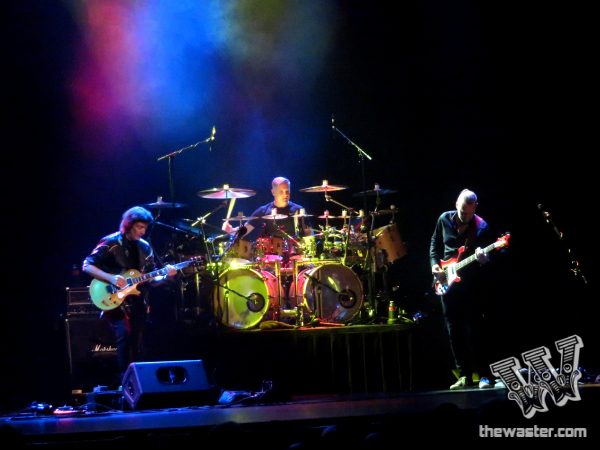



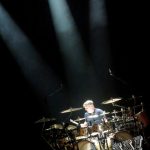
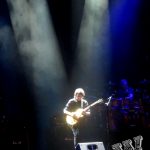
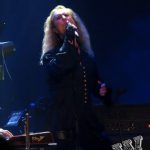
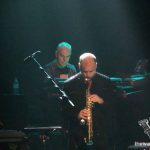
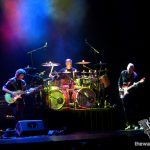

Nice article. I’m surprised by the few typos I stumbled across (and see all the time on web sites such as this). Let me know if you need a proofreader for any future projects / edits?